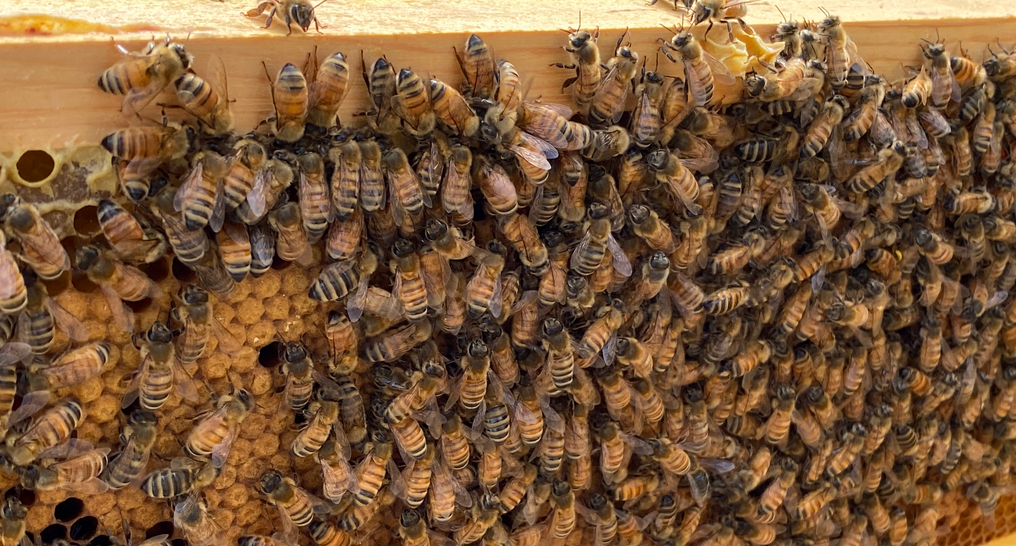This originally published in Dave Hartmann’s blog, Dave’s Stories on July 12, 2020. It is re-published here with the author’s permission.
“Save The Bees!” We’ve all heard it. You might be thinking of doing something about it. I did, or rather, I grew to want to try it after seeing a neighbor set out hives year after year. The curiosity definitely grows when you keep driving past hives that, sometimes, have boxes stacked six feet high, sometimes that same stack is only a couple feet high. I had to know more. Plus, I’ve always loved honey.
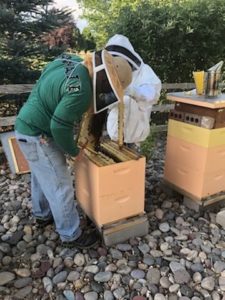
It’s a lot like ranching or farming, just on a much smaller scale. Instead of 640 acres, you need about 10 square feet. I’ve learned it has parallels to being in the military and being a veteran. It can be a fantastic pursuit for those veterans with time on their hands looking for something to do besides day drinking and keyboard cowboying. Conversely, it is a good hobby for those of us whose jobs keep us stupid busy. It’s a hobby that takes planning, focus, and education.
Four years ago, I dove into the book “Beekeeping for Dummies” over the winter. I also stalked my neighborhood beekeeper’s email from our HOA correspondence, thankfully he became, and continues to be, a good friend and fantastic resource.
Fast forward to today. We have seven hives, a few stings, more honey than we know what to do with, beekeeper friends, countless hours of Youtube, and a whole lot of fun, sweat, and a few tears under our belt. The entire family gets involved. Plus, we have a steady stream of wax for my wife’s soap and lotion business.
I won’t teach you how to be a beekeeper here. But I will write about how to learn. Here are some basics:
It’s seasonal. You start beekeeping in the Spring. That’s just the way it is. If it’s not Spring and you aren’t ready to start a hive, then just spend from now until Spring learning and preparing.
Offer help. Whatever month it is now, find some beekeepers and offer help. Odds are, they’ll need it and have extra bee suits for you to use. You will then get more brains to pick about what works in your area.

Read and watch. Get a book. Get several books. Watch videos. Get a mentor or several. My neighbor has been invaluable, plus we keep an eye on each others’ hives when we’re gone. Join the local club, just about every community has one. Be careful with the videos, you’ll want to look for those from your area or at least from a similar climate and altitude.
I live at about 5,000’ elevation in Western Colorado. There are some great videos out there made in the deep south, the UK, all over the world. Take them all with a grain of salt. All those tips, tricks, and time-of-year recommendations are like tools in your toolkit. It’s handy to have them, they just may not be applicable all the time.
Prepare for getting really attached to your bees. I know it sounds weird. Years ago I heard grown men and women get emotional talking about how devastated they were after losing hives over the winter. Once you dedicate yourself to raising animals of almost any kind, you will know. It’s common for me or any of my family to rescue one of “my girls” from a pool of water, or who got stuck outside on a cold night. I’ll pick up a bee on the blade of my pocket knife and deliver her to the front of a hive. With every rescue, I remember my uncle bringing in one or two runt calves into the basement every North Dakota winter. You there, rolling your eyes right now, mark my words, you’ll shed a tear or two with your first big die off.
Here’s the funny and unexpected thing

I’ve learned now after a few years: beekeeping has a surprising number of parallels with the military. Stay with me…
It has its own language (that sounds crazy to outsiders). Remember the looks you get when words like SAWs, MCLCs, Hummers, terps, and LNO’s slip into everyday conversation? Prepare for that same look when you talk about nucs (nukes), crazy brood, beautiful queens, drones, a good smoke, double-deeps, royal jelly, and those @#$%! Varroa mites.
It’s an inconsistent return profession. We’ve all known good military people who got stuck with “the big green weenie.” It could have been you or me. You did everything right but still got the shaft. Conversely, we all know raging blue falcons who had a long stellar career.
Bees are kind of domestic, kind of feral. You’ll love them and you’ll cuss them. You can do everything right and they still might die or abscond on you. You can screw up big and bad, and they might be fine. You cannot keep them fenced in like livestock. All you can do is stack the odds in your favor with timing, setup, feeding, treatments, and hope for the best. From golfing to gambling, inconsistent return hobbies are the most addictive.

The best jobs are a bit dangerous. If you get complacent or do dumb things in the military (or many vocations), it can hurt you and those around you. I always tell my friends and their kids who deploy the same thing. “Watch out for stupid people doing stupid things and you’ll be ahead of the 90% of the people who have problems downrange.” Every deployment has those stories.
This also rings true with bees. I haven’t been stung very often, but the two multiple-hit events were both unpleasant and completely avoidable. Five of my hives are docile enough to let me pop off the lid and take a peek without riling them up. But this, I learned, is stupid. I have a couple of hives that are just cranky. They do not like attention or company. If I bump one hive, in particular, they will come out swinging, looking to sting me and anyone around me. So now, after one rodeo when I got stung nine times, I nearly always suit up. Lesson learned. To quote my Army buddy who also ranches, “Even dumb animals understand pain.” I’m so dumb it took me a while to realize he was talking about me.
Cool gear. Yes, I know the Army was supposed to issue you everything you’d ever need while serving. Ha, ha, very funny. We all still have tubs and duffels full of gear we purchased from good tactical gear to crap we used once, maybe. Either way, we can’t bring ourselves to pitch it.
Beekeeping gear runs a close second for coolness. You get suits, hats, hoods, gloves, flat hive tools, J-hook hive tools, smokers, solar wax melters, honey extraction spinners, the possibilities are endless. I even bought a tiny bore scope camera that runs dual use for a quick peek in the hive. The bee gear companies give Cabelas a run for the “thickest master catalog” prize. Enter the murder hornet phenomenon and you may consider combining your tactical kit and your bee kit!
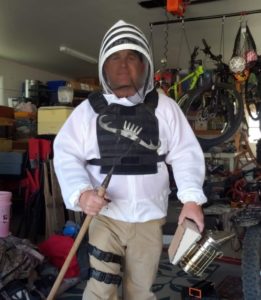
Weird friends. Veterans know that they either hang out with their veteran friends or their civilian friends. Each will think the other is weird or nuts or both. Your friends all want to ask what the other group is like, but probably won’t.
Beekeepers come in all shapes and sizes. But when we get together, all we talk about is beekeeping. Our spouses roll their eyes and go talk elsewhere. Be careful not to become “that guy,” the outcast at parties when “all he talks about is bees!” Sound familiar, veterans?

You must think on your feet. We all know the phrase “No plan survives first contact.” Semper Gumby, all of that. The best soldiers who have muscle memory and critical info between their ears don’t need to go look something up when people are yelling or shooting or both.
When you do a hive inspection, you get all suited up, have your smoke going, have your tools and a plan handy. Often, you’ll open up a hive and get surprised when things don’t look right or the hive is being squirrely. You have to think on your feet while you are right there and suited up. The bees won’t wait for you to leave a hive unboxed, go home, Google a few things, then come back with a new plan. You need to act then and there. Thankfully nobody’s life or limb is on the line, but it still puckers you up.
Reflection. At the end of any long mission that went reasonably well, you can sit back with pride enjoying having actually done something right. You learned something, you congratulate your people who do well. You set aside some remedial training time to work with others who did not.
Same with beekeeping. In the fall, after you’ve weighed the last honey harvest, you set up your hives for the winter and hope for the best. You gloat a bit on the good hives but worry about the hives that didn’t too as well. You seek out advice and self-training for ways to improve.
I’ve found it cathartic. You will see or read news on the decline of pollinators and how their health affects the health of our entire food chain. You can take some pride in being part of the solution.
You’re in it for the long haul. Nobody becomes Sergeant Major straight out of Basic. In 2003, it took me five months into my deployment before I felt a little bit like I might actually be good at the job I was trying to do.
Beekeeping success is measured in years. At three years in, lots of friends wanted lots of advice. I always gave it, but with a big asterisk. Sure, I had been an apiarist for three years, but that meant I’ve harvested honey exactly four times, in four days. I’ve only made it through the Spring swarm season three times and only went through one rough winter. It takes time. I’m still learning and will be learning forever.
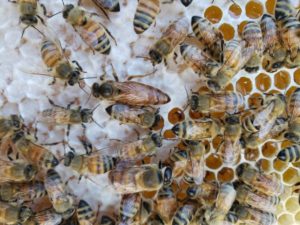
You’ll be a better person. Bold words, I know. I’m no shrink, but I think work or hobbies that are seasonal or at least cyclic are just plain good for you. I have scores of farmers and ranchers in my family. While working the land can be immensely frustrating, it also just feels good in a way that most jobs don’t. I’m an avid hunter, and much of hunt satisfaction comes from planning out the year of applications, map research, scouting, actually hunting, meat processing, then starting the whole process over again while tweaking it for the year ahead.
Many jobs (but zero hobbies, hmmm) out there seem to never end, have no real seasonal milestones, closure moments, few tangible accomplishments, or are just plain unsatisfying. The phrase “going postal” came about for a reason!
If you have a job like that, I highly recommend picking a hobby, if not a new job, that comes with some sort of seasonal flow. Something you can plan on every year, and better yet, get you closer with the natural world around you. You will feel better, I guarantee it.
If you are a veteran looking for a hobby that may just scratch that unsatisfied itch you’ve had since getting out, see if you’re up to the task of ranching these amazing bugs.
Save the bees. You might just save yourself.
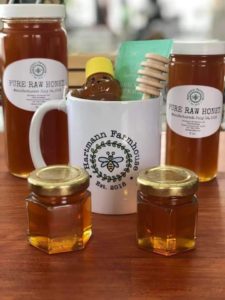
_____________________
David is a father, husband, son, boss, writer, beekeeper, outdoorsman, occasional teacher, compulsive elk hunter, Afghanistan veteran, and living proof that anyone is trainable. He is a 1994 South Dakota School of Mines graduate. David spent 12 years in the Army and Army Reserve as an Engineer Officer before that career was cut short with Afghanistan injuries. He spent decades as a consulting civil engineer working in communities all around the American West and now oversees his firm’s engineering department. David continues to amaze both friend and foe being an engineer who can write a story.

Buy Me A Coffee
The Havok Journal seeks to serve as a voice of the Veteran and First Responder communities through a focus on current affairs and articles of interest to the public in general, and the veteran community in particular. We strive to offer timely, current, and informative content, with the occasional piece focused on entertainment. We are continually expanding and striving to improve the readers’ experience.
© 2024 The Havok Journal
The Havok Journal welcomes re-posting of our original content as long as it is done in compliance with our Terms of Use.
